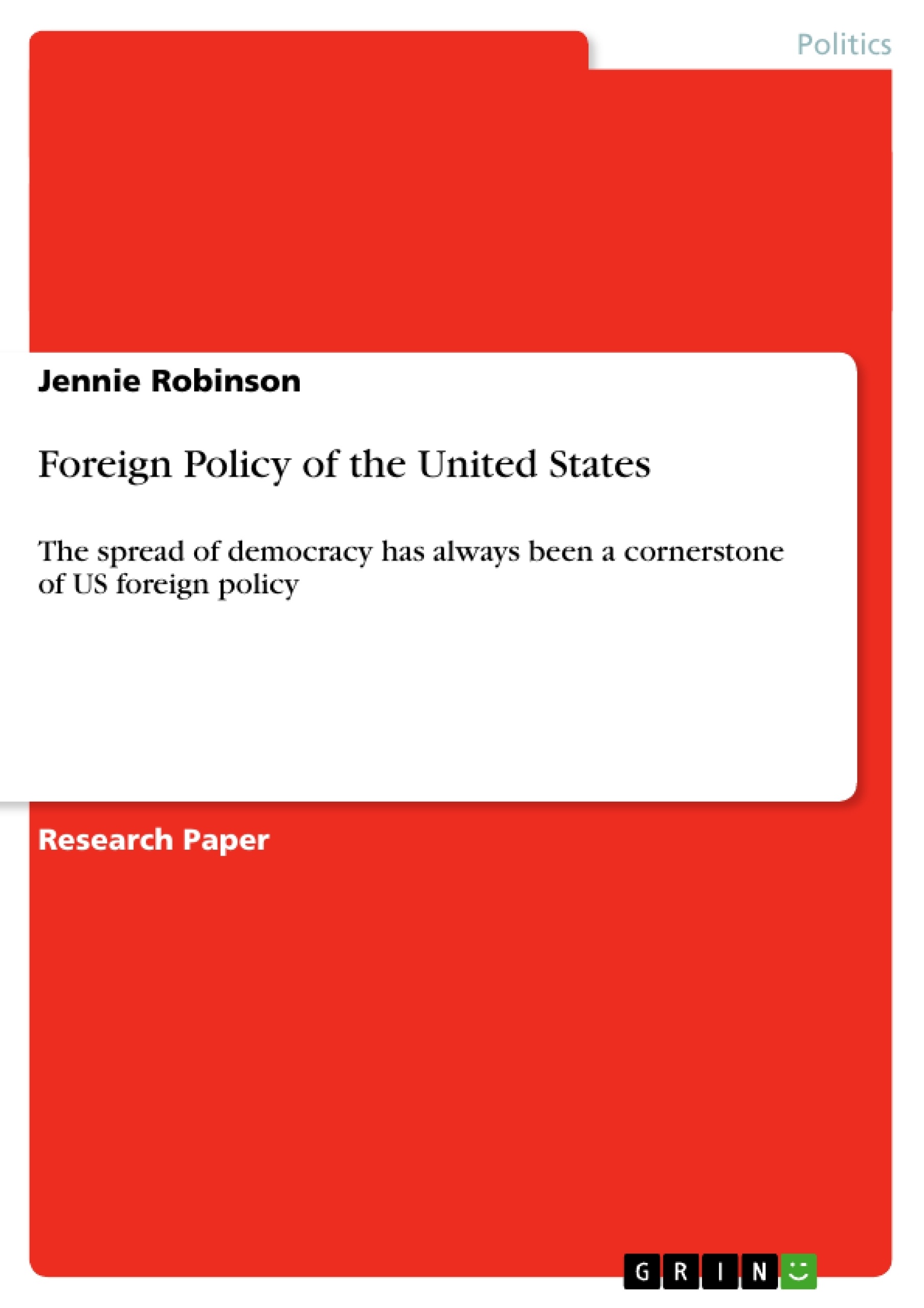Since the period of American Revolution, the idea of democracy has become rooted in American culture and traditions. Democracy was and is still considered as a successful means for order, peace and prosperity in a country but also internationally among democratic nations. Prosperity is for instance found in the establishment of free trade, as it suggests that democratic countries would rather seek the benefits of trading with each other rather than waging a war and face its costs. Regarding US foreign policy, democracy has evolved as being a foreign policy objective, which implies contradicting types of interventions, i.e. the need to spread democracy and even wage war for it as opposed to the toppling of democratically elected government which are not keen to contribute to US interests. Democracy has thus raised criticisms and praises, with those seeing it as part of the US rhetoric to respond to corporations interests or that the US has been ineffective in spreading it, and those who see it as part of a US liberal strategy for international order. The export of democracy hence became a controversial question since it has been argued that democracy need to grow locally and thus a mission to spread it is part of an unrealistic policy. In the context of these different issues, this assignment will address the question as to whether “the spread of democracy has always been a cornerstone of US foreign policy.”
Inhaltsverzeichnis (Table of Contents in English)
- Introduction
- Development
- Democracy
- Democratic peace theory
- Democracy and free trade
- US foreign policy
- Debate
- Unrealistic policy?
- Democracy
- Conclusion
- References
Zielsetzung und Themenschwerpunkte (Objectives and Key Themes in English)
This assignment aims to explore the assertion that the spread of democracy has always been a cornerstone of US foreign policy. It examines the historical development of this idea within US culture and foreign policy, analyzing the motivations behind promoting democracy abroad and its impact on US foreign policy.
- The evolution of democracy as a US foreign policy objective
- The relationship between democracy and free trade
- The role of democratic peace theory in shaping US foreign policy
- Criticisms and praises of the US's "export of democracy" policy
- The debate surrounding the effectiveness and realism of US democracy promotion efforts
Zusammenfassung der Kapitel (Chapter Summaries in English)
The Introduction lays the groundwork for the analysis by outlining the key themes of the assignment and providing a brief historical context for the evolution of democracy within US culture and foreign policy.
The Development section delves into the concept of democracy, focusing on the benefits of representative democracy and its inherent challenges. It then examines the relationship between democracy and free trade, highlighting the liberal view that trade fosters economic growth and democratic institutions. The section also explores the Democratic Peace Theory, analyzing its strengths and limitations and its influence on US foreign policy.
The US foreign policy section examines how the concept of democracy has influenced the US's international role and its approach to foreign policy. It delves into the two seemingly contradictory approaches to US foreign policy outlined by H. Kissinger, highlighting the debate between promoting democracy at home and crusading for it abroad.
Schlüsselwörter (Keywords in English)
Key terms and concepts explored in this assignment include democracy, US foreign policy, democratic peace theory, free trade, liberalism, international order, and the export of democracy.
Frequently Asked Questions
Has the spread of democracy always been a cornerstone of US foreign policy?
This is the central question of the assignment, exploring how democracy evolved from a cultural value into a strategic foreign policy objective with contradictory interventions.
What is the Democratic Peace Theory?
It is the theory suggesting that democratic nations are less likely to wage war against each other, preferring order, peace, and prosperity through trade.
How are democracy and free trade linked in US policy?
The liberal view suggests that free trade fosters economic growth, which in turn supports the establishment and stability of democratic institutions.
What are the main criticisms of the "export of democracy"?
Critics argue that democracy must grow locally to be effective and that using it as a reason for intervention can be a rhetorical cover for corporate interests.
What are the two contradictory approaches to foreign policy mentioned?
As outlined by H. Kissinger, the US oscillates between promoting democracy by example at home and "crusading" to spread it abroad through intervention.
Is the policy of spreading democracy considered realistic?
The assignment debates whether the mission to export democracy is an unrealistic policy, given that many argue democratic systems require specific local conditions to flourish.
- Citar trabajo
- Jennie Robinson (Autor), 2006, Foreign Policy of the United States, Múnich, GRIN Verlag, https://www.grin.com/document/135438



